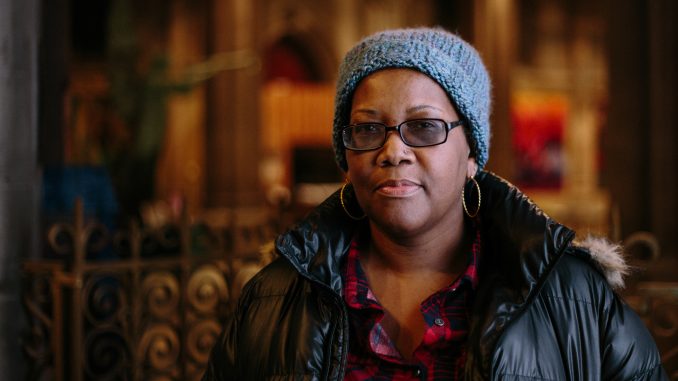
At a Temple Student Government student forum more than two weeks ago, Glenda Bryant stood face-to-face with President Theobald, voicing her opinion about why university administration has mishandled communication with nearby community members about a possible on-campus stadium.
Now, she wants people to know she isn’t the only voice of the community.
“The only reason my name is out there is because as far as I know, I was the only community member who was at that meeting, so I spoke up for other community members,” Bryant said at the Church of the Advocate on Thursday. “There’s some people here who would have spoken just as eloquently, just as loud and would have been just as in his face as I was.”
Bryant, a 54-year-old social work major, is a local minister and teacher. She has lived in North Philadelphia for most of her life.
She was born at Temple University Hospital in 1961, and was raised in a house near 18th and Huntingdon streets—the same one she lives in today. Her grandparents bought the property in the 1950s, and it has housed her sister and her kids, and Bryant’s niece and her son.
Today, she’s a senior at Temple, and graduated with an associate’s degree in behavioral science from the Community College of Philadelphia last May. Her feelings toward the university, however, have changed since when she was growing up.
“I would ride by it, and I would go, ‘I want to go there,’” she said. “It was a prestigious university, you heard about it all over the country. … But then when I started hearing some of the policies and decisions they make about how they spend their budget every year, and then hearing about the stadium, just the more and more I heard about it, I wasn’t as proud.”
Along with being a full-time student, Bryant works two jobs: as a licensed minister at Overcomers Christian Center at 43rd and Westminster streets, and a ministry class teacher at the Christian Lifestyle Institute on 52nd Street near Greenway Avenue.
Despite all the religious work she does, knowing her home community is an important lesson she’s learned since starting three years ago.
“You really don’t have a leg to stand on if you start complaining and there is something that you could do and you didn’t,” Bryant said.
Bryant has regularly attended Stadium Stompers meetings at the Church of the Advocate, one of the organizations that opposes the possible on-campus stadium.
Pele IrgangLaden, 2015 alumnus and leader of the group, said Bryant’s contributions have been invaluable.
“Glenda has been a great bridge between students and community members because she’s lived in North Philadelphia and is also a Temple student,” IrgangLaden said. “Besides all the great ideas she has, she’s been a big part of bridging those communities.”
Despite the magnitude of challenging the stadium, Bryant said life itself has posed many more challenges.
“I’ve been around for a minute, I’ve been around for over five decades,” she said. “So life in itself, the things people go through [are tough],” she said.
One of her biggest challenges, she said, was giving birth to her daughter when she was 17. Now, Sharita Benson is 37, and works as a fashion designer in Greensboro, North Carolina.
“I love that she’s doing what she loves to do and making a living out of it,” she said. “That’s what any mother wants for her child, so she did well in spite of me and a little bit because of me.”
Regarding the current struggle involving stadium discussions, Bryant said a lack of information and communication has led to the divide between the community and university administrators.
She added, however, that protesters need to remain focused and deliver a clear anti-stadium message to administration.
Even if community discussion starts, it may be too late, Bryant said.
“President Theobald, I think, mentioned that once he has recommended to the board to move forward, then he would have town hall meetings,” she said. “I’m like, ‘But you’ve already decided.’ So you’re basically not having a meeting with us to find out how we feel, you’re having a meeting with us to tell us what you’re going to do.”
Bryant admitted that an issue complicating the process is the polarizing views of individuals who support or oppose an on-campus stadium. She believes it stems from the media, people’s backgrounds and who raised them.
She thinks, however, that people in Temple’s surrounding neighborhoods are judged too quickly—which then leads to friction between the community and university.
“A lot of people look at North Philly, they ride the streets and they might see trash, they may see abandoned buildings and things like that, and they get this idea that people don’t care about their neighborhood,” she said. “And it’s just not true. Sometimes it gets overwhelming, yes, and there are some people like that, but darn it, there are people like that in every neighborhood.”
“I’ve heard from students in some of my classes, I’ve heard with my own ears that people in the neighborhood, they don’t care,” she added. “I always have to say, ‘Wait a minute, everybody’s not the same.’ You know? There are some people there that do care.”
Steve Bohnel can be reached at steve.bohnel@temple.edu or on Twitter @Steve_Bohnel.
Video by Jenny Kerrigan.


Be the first to comment